This is the newsletter version of Sara by the Season, where I explore what is piquing my curiosity as I try to lean into nature’s wisdom and rhythms. You can listen to me read you the newsletter by hitting play above - or you can click the little link above and to the right to play in your favorite podcast player. Please excuse my voice in this week’s recording - I’m recovering from a cold, and I didn’t realize how rough I sounded until I was already halfway through!
If you know someone who would like this sort of thing, I’d be so grateful if you would share it.
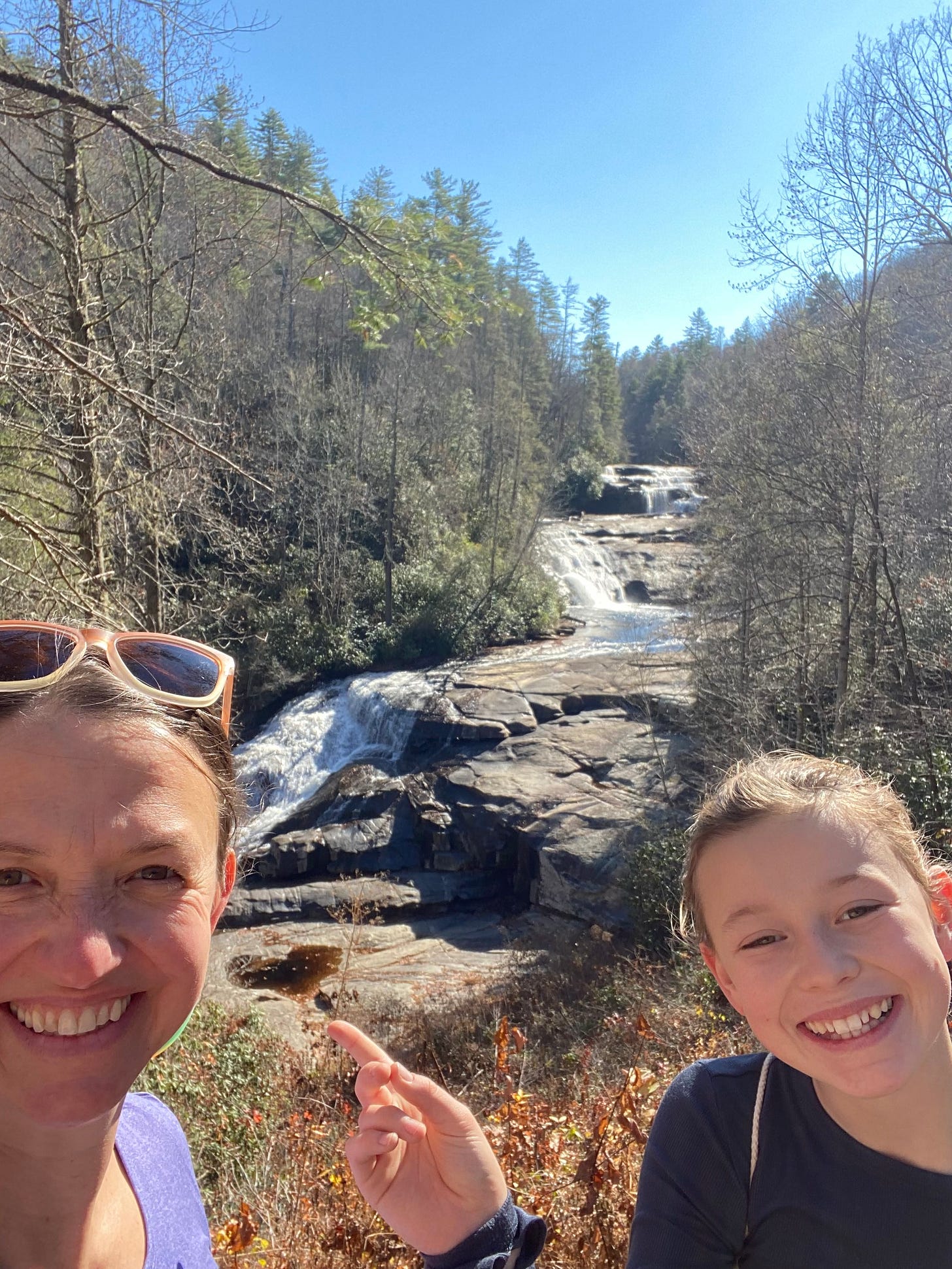
I haven’t typically been a “word of the year” person, but toward the end of last year, I kept feeling this need for depth in 2024. It feels like a potentially heavy year from the start with the US election season and the state of the world generally. As last year winded down, I found myself yearning to go deeper, instead of my tendency, which is to be interested in ALL of the things but in a relatively shallow way (#enneagram7problems). Several years ago, I read this article from the always-worth-reading David at Raptitude about what he called “the depth year.” He describes it (tantalizingly, if you ask me) like this:
I keep imagining a tradition I’d like to invent. After you’re established in your career, and you have some neat stuff in your house, you take a whole year in which you don’t start anything new or acquire any new possessions you don’t need.
No new hobbies, equipment, games, or books are allowed during this year. Instead, you have to find the value in what you already own or what you’ve already started.
You improve skills rather than learning new ones. You consume media you’ve already stockpiled instead of acquiring more.
You read your unread books, or even reread your favorites. You pick up the guitar again and get better at it, instead of taking up the harmonica. You finish the Gordon Ramsey Masterclass you started in April, despite your fascination with the new Annie Leibovitz one, even though it’s on sale.
The guiding philosophy is “Go deeper, not wider.” Drill down for value and enrichment instead of fanning out. You turn to the wealth of options already in your house, literally and figuratively. We could call it a “Depth Year” or a “Year of Deepening” or something.
Since reading that, I’ve wanted to really go all-in on a depth year, but I tend to peter out around March, if I even make it that long. One of my ways of living in tune with the seasons is to change up my mindfulness practices based on the season we’re in. This is how I teach yin yoga too. I try to pick a practice each season to dig into using what’s going on in nature as my guide. By going deeper with a particular practice for an entire season, I have kept myself from jumping quickly from one thing to the next when boredom or discomfort sets in, and I’ve found value in practices that I might otherwise have skipped. For example, in the winter, I tend to double down on yoga nidra because winter is a time for rest and topping off our buckets before the energy of spring arrives. At first, I found yoga nidra very uncomfortable and seemingly pointless, but, because I stuck with it some winter many years ago now, it’s become one of my most beloved practices.
Toward the end of 2023, I kept noticing “heart” come up - either the word itself or practices around the heart or something similar. Instead of trying to go full-on depth year on everything, I’ve decided to lean into my intuition’s inkling and make 2024 the year of heart.
In many Eastern traditions, the mind isn’t just in our brains, which is what most of us in the West think of when we hear the word “mind.” Instead, in many Eastern traditions, there is the idea of the heart-mind. In Chinese philosophy, the word for heart, xin, refers to both the physical heart and the cognition that we Westerners typically associate with the brain. Xin is typically translated as heart-mind instead of just heart in order to convey this cultural difference in understanding. Buddhism has the idea of citta, which meditation teacher Jack Kornfield tells us is also translated properly as heart-mind and has “many dimensions. It contains and includes all our thoughts, our feelings and emotions, responses, intuition, temperament, and consciousness itself.” Prior to the Enlightenment, it is likely that most Europeans did not have the rational distinction between the mind and the heart that most of us do today. The Greek word typically translated as heart is kardia. It is used nearly 1000 times in the Old and New Testaments, and its definition sounds much closer to the Eastern idea of heart-mind:
denotes the center of all physical and spiritual life
the center and seat of spiritual life
I love how author Liz Jensen puts it:
Were “heartmind” a word in the English lexicon, it would be designated as a noun, but in its origin it’s both noun and verb, and the Chinese, who make no distinction between what you are and what you do, would never understand the separation of the two. What you are is what you do, what you do is what you are. Heartmind is simultaneously both being and doing, an inherent coupling that arises on its own volition and does so everywhere and at all times.
All of that to say, I’m not so much interested in going deeper in practice and understanding with the Western idea of heart, which is mostly just an organ that pumps blood, but I am very curious about recovering this older idea of the heart as a seat of our intuition, our connection with Source, and a deeper well of wisdom beyond the rational.
Here’s what I’m thinking so far in case you want to come along for the ride or even just dip your toes in a bit:
Metta meditation is an especially heart-oriented meditation practice. Metta, typically translated as loving-kindness, is one of the oldest Buddhist meditation practices. It involves wishing ourselves and others well-being. I love this further description if you’re interested in learning more. Metta specifically, more than many other meditation practices, has a ton of rigorous research behind it (in addition to the millennia of experiential data, of course), that includes physical and mental healing benefits, increases in our capacity for empathy and social connection, it promotes physical resilience, and plenty more. For me personally, I have noticed my greatest growth in self-compassion during seasons of Metta practice. In my seated practice this year, my intention is to practice Metta at least three times a week, if not more. I recorded a Metta meditation if you want to try it for yourself, or there are plenty of free options out there. One thing I like about going deeper with Metta meditation is that the phrases you use in the practice can become like mantras themselves that pop up usefully throughout the day.
HeartMath is an organization I first learned about several years ago whose vision is to “develop a system of effective, scientifically based tools and technologies to bridge the intuitive connection between heart and mind and deepen our connection with the hearts of others.” They have done extensive research into the benefits of connecting our hearts and minds, and they offer many tools for doing so. My go-to is a simple practice HeartMath calls Quick Coherence, and here are the steps. I try to use this before difficult conversations and notice that, when I do, I’m better able (sometimes!) to find that pause before reacting with defensiveness or anger. This seems especially important for me in 2024. But I’m curious about the effects of incorporating this practice into my day in some way as a way of building heart coherence and intuitive knowing, as well as a sort of preventative medicine to get less hooked by outside stimulus.
Heart-focused reading, watching, and listening. I have some books on my TBR shelf that I plan to dig into, and I plan to look out for other titles that have something to do with heart in the year ahead (including plenty of romance novels, which make me feel warm and in touch with my heart - and have a guaranteed happy ending). I’m thinking I could also use the idea of heart-mind and intuition as a guide for my watching and listening intake this year too.
Morning pages of some sort. One thing I fell out of practice with in 2023 was my journaling practice, and I felt it. During Covid when I was working from 100 percent of the time, I had a decent morning pages practice, which is a practice of writing three pages first thing in the morning, stream-of-consciousness style, usually credited to Julia Cameron and better described here. When I have a regular journaling practice, I notice that I was better in touch with that still, small voice inside. Some call it intuition or God or the Divine or your soul speaking - I don’t really think it matters what you call it so long as you develop some capacity to listen to it. Most human civilizations have associated this inner voice or inner knowing with the heart.
Capitalism, white supremacy, patriarchy, and fundamentalisms of any sort desperately need us detached from developing this inner knowing so that they can 1) tell us what to think and what we want and need and 2) by doing so, control us. This means that strengthening your intuition is vitally important and counter-cultural work, and I have found the best two ways to build my capacity to recognize that still, small voice are journaling, preferably first thing in the morning before I’ve had a chance to really wake-up and…
Walking long distances without distractions. The best way that I know how to deal with a problem or frustration in my life is to go on a long walk outside without my phone. I find that I’m able to, most importantly, settle down. There is something about moving that grounds me in ways that other things can’t. Once I’m a bit more settled, I can listen.
Most of us who are parents or spend much time around kids, I think, can see how younger kids have this intuitive sense and awareness. But, for many of us adults growing up in this system, especially women, we’ve lost much of our innate ability to even hear this soul voice in the first place, let alone trust it enough to follow what it says. A big part of adulting, then, is recovering this atrophied muscle and building it back up again.
Michael Meade in his classic The Genius Myth calls this inner knowing our “divine spark,” and he says that only by listening to the voice of the divine spark can we become fully who we were meant to be:
The human soul is a living paradox—neither a predetermined personality nor a completely open possibility. The point in this life is not simply to “become somebody,” but to become who we were each intended to be when we first entered this world. For each of us has the most to give and contributes most meaningfully when we become who we were intended to be from the beginning. That is the inside story and the hidden message that has been etched upon each soul.
For me, moving outside without electronic distractions is the best way to recognize the voice of my own divine spark, and, hopefully, after time, rebuild my trust in following what it says, which seems like the highest work of not only my heart, but of being human.
I’ll report back on my “depth year of heart,” and I’d love to hear if you try any of these practices or ideas too.
Here’s to going deeper in 2024,
Sara





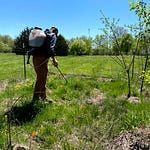


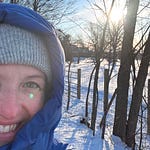
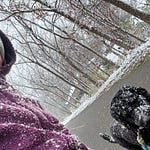
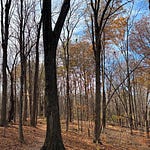

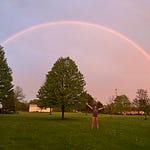
Share this post